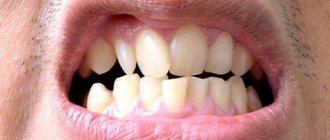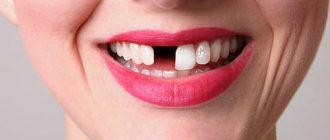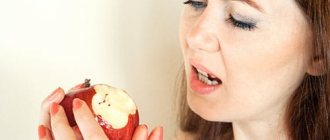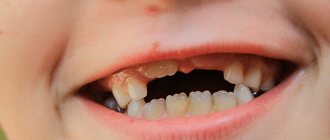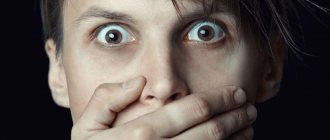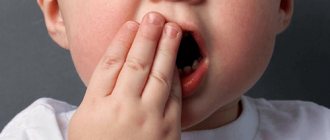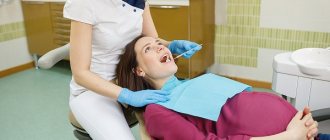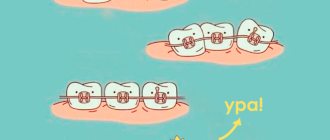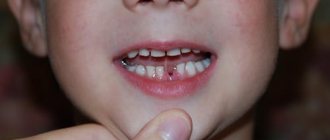Itchy teeth - how does it manifest itself? Possible causes of this symptom and options for its elimination
Often, patients turn to dentists with a rather strange complaint - itchy teeth. Most often, a person has no idea what this symptom is or why it appeared. As a rule, such itching indicates the development of some pathological process, so first you need to find out its cause and only then begin the appropriate treatment. In children, a similar symptom may indicate that the process of teething has begun; in adults, it more often signals the onset of inflammatory processes in soft or hard tissues. Read more about why your teeth may itch and what to do about it.
Bruxism
In some cases, itchy gums are caused by bruxism - teeth grinding, which most often occurs during sleep. In addition to discomfort in the gum area, bruxism can damage tooth enamel and negatively affect the health of the jaw joints. In addition, as a result of excessive stress on the teeth, the gums often begin to recede, exposing the neck and roots of the teeth.
Up to contents
The information in this article is for reference only and does not replace professional advice from a doctor. To make a diagnosis and prescribe treatment, consult a qualified specialist.
What sensations arise when they say – teeth itch?
Dentists are often contacted complaining of strange and not very pleasant sensations. Patients describe them as follows: the teeth seem to itch and itch. But in fact, such symptoms can be provoked by a variety of pathological processes. For example, sometimes similar sensations occur when inflammation develops in nearby soft or hard tissues.
Strange and not very pleasant sensations arise
And after removal, injured tissue may itch slightly while the process of restoration and healing takes place. When a similar symptom occurs in children, it may indicate the eruption of primary or permanent incisors and molars.
Possible causes of itching
Obviously, there are many potential reasons for this phenomenon. Some patients are bothered by itching in a limited localization on the gum or oral mucosa, others complain that the entire gum itches. To understand what triggered the symptom, you definitely need to visit a doctor.
Manifestation of an allergic reaction
Hygiene products, that is, toothpastes and mouthwashes with flavors and preservatives, can act as allergens. A similar reaction can also be provoked by an ointment applied to the mucous membrane, including a means to improve the fixation of the prosthesis. Allergies are sometimes provoked by the dentures themselves, or rather by the materials from which they are made - acrylic with toxic monomers in its composition or nylon. The cause of itching in the gums may be an allergy, for example, to metal braces.
“When my allergy started after the installation of an acrylic prosthesis, my gums began to itch so much that it seemed like the remaining teeth were itching. There were very unpleasant pulling sensations. Then I immediately went to the doctor, he told me to take off this prosthesis and need to make a new one. When the mucous membrane gives an allergic reaction, you will immediately understand it; you won’t confuse it with anything else.”
Evgeny V.D., from correspondence on the forum www.32top.ru
The cause of itching in the gums may be an allergy.
When an allergic reaction develops, other symptoms are usually associated, for example, swelling, redness, and soreness. In such a situation, it is better to take an antihistamine and avoid direct contact with the allergen. To prevent more serious consequences, you should seek help from a specialist.
Diseases of the oral mucosa
Quite severe itching often occurs against the background of certain diseases of the mucous membrane. Experts in the field of periodontology include the following diseases as such pathologies:
- periodontitis and periodontal disease – inflammation and destruction of periodontal tissue and ligamentous apparatus, leading to loosening and tooth loss. According to statistics, patients with similar diagnoses in almost 15% of cases cite unpleasant itching in the gums as one of the disturbing symptoms1,
- gingivitis is an inflammation of the gum tissue, including the areas between the teeth (gingival papillae), which causes redness, soreness and bleeding,
- stomatitis - inflammation of the oral mucosa, which is characterized by the appearance of painful and itchy ulcers,
- leukoplakia - thickening and keratinization of the upper layer of epithelial cells, in which the affected areas acquire a whitish or grayish tint, and the patient experiences obvious discomfort, burning and itching,
- candidiasis is a bacterial infection caused by the uncontrolled proliferation of a fungus of the genus Candida, which leads to the formation of a dense, indelible coating on the tongue and mucosal surface, as well as the appearance of characteristic symptoms, including itching.
The cause of the appearance of characteristic symptoms can be stomatitis.
These are only the most common diagnoses made in periodontology. The symptoms of many diseases are similar, so to clarify the cause, you must consult a doctor and undergo an appropriate examination. In addition to a visual examination, radiography may also be required, including an orthopantomogram, as well as an oral smear.
Acute deficiency of vitamins and important microelements
If the body does not receive enough vital microelements, vitamin C and zinc deficiency may develop over time. The lack of these substances most often affects the condition of the gums, in particular, it leads to the fact that the mucous tissues weaken, become more friable, itching and bleeding occur. In advanced cases, teeth become loose and even fall out.
Nervous system disorders
Often similar sensations arise due to nervousness. Constant stress and anxiety or sudden mental shocks - all this affects the physiology of the body. The oral mucosa is also affected. Often, against the background of nervous system disorders, inflammatory diseases develop, for example, aphthous stomatitis.
Stress has a detrimental effect on health
Dental diseases
When the front or chewing teeth begin to itch, this may indicate the development of dental diseases. Experts include the following pathological phenomena as possible prerequisites:
- abundant accumulations of plaque and subgingival deposits as a result of insufficient hygiene or disturbances in the gastrointestinal tract, endocrine system,
- bruxism or involuntary clenching of the jaws during sleep, leading to pathological abrasion of the enamel,
- initial caries or sluggish pulpitis can provoke sensations reminiscent of unpleasant itching within the affected area.
Abundant accumulations of plaque and subgingival deposits can also cause itching.
Similar symptoms in some situations appear after an extraction procedure or poor quality dental treatment. In the second case, itching signals the possible development of complications - you need to consult a doctor again.
Other Possible Prerequisites
As for what else can cause your teeth to itch, you can also consider this symptom as a secondary manifestation of other pathological processes occurring in the body. In some cases, itching occurs due to colds, including the flu. It must be said that injury to the mucous membrane can lead to a similar clinical picture. To understand exactly what itching in teeth means, you should consult a doctor.
What measures need to be taken
Important! Be sure to visit a dentist, and possibly an allergist.
The specialist will prescribe the correct treatment appropriate to the diagnosis . He will advise you to use suitable toothpastes containing the necessary substances, as well as ointments, balms and rinses for gums and teeth.
Photo 2: If you have gum disease, such treatment is necessary; without it, you are likely to lose your teeth. Source: flickr (Boise Dentures)
If discomfort occurs after the installation of prostheses or other devices , you should immediately notify the treating doctor.
Be sure to take measures to improve immunity .
“Age-related” features of symptom manifestation
Teeth can begin to itch at any age, but in different situations this will be the result of different preconditions. Below are clinical cases that occur more often in a certain age range.
Itching in childhood
Many parents are interested in the question of whether a small child’s teeth or gums, that is, still a baby, can itch. That's right, this symptom occurs against the background of the eruption of primary incisors. During this period, babies usually become capricious and cry a lot, putting any rattles or fingers into their mouths. The beginning of the process can also be noticed by external signs: the gums swell a little, turn red or even turn blue if a small bruise appears. Later, a white stripe appears when the tooth has already broken through the thickness of the gum.
In infants, this symptom may occur during teething.
Older children may also complain of similar symptoms. And in this case, they usually indicate the beginning of a change in bite. During this period, it is important to regularly bring the child for preventive examinations so that a specialist, if necessary, can recognize abnormalities in time and begin appropriate treatment.
When does the symptom appear in adolescents?
If a teenager complains of similar symptoms, this may indicate the development of some pathological processes. This requires diagnosis by a doctor, because the cause is often hidden inflammation inside the tooth or gum tissue, and then the sooner treatment begins, the faster the problem can be solved with minimal risk of complications. By the way, itching often occurs against the background of bite correction with braces. Similar sensations may occur immediately after installation of the system or correction of the arc tension force.
Often itching occurs during bite correction with braces.
As an adult
In an adult, symptoms can be triggered by smoking, drinking low-quality alcoholic beverages, or an allergic reaction to the material of a filling, crown or prosthesis. Sometimes such symptoms are caused by inflammation in the gums and mucous membranes, including gingivitis, periodontitis, glossitis or stomatitis.
Often such a reaction is caused by neuralgic disorders, which, by the way, include bruxism. Constant trauma to the mucous membrane from protruding parts of an incorrectly fitted prosthesis, poorly installed crown or filling also provokes similar sensations of discomfort.
Bruxism is also a cause of the problem
Itchy teeth during pregnancy
In a girl during pregnancy, the cause of itching may lie in inflammation of the gums - gingivitis is considered a frequent companion of expectant mothers during pregnancy. Also, due to serious changes in the hormonal background, there is an intensive leaching of calcium from the body, which causes the enamel and hard tissues to weaken, and hyperesthesia develops. Itching sometimes has neuralgic background and can be a consequence of the development of dental diseases such as caries, pulpitis, stomatitis or, for example, periodontitis.
During pregnancy, there can be many causes of symptoms
Homeopathic treatment for itchy gums
| Disease | Drugs |
| Periodontal disease |
|
| Periodontal disease due to diabetes |
|
| Periodontitis |
|
| To relieve the feeling of itchy gums |
|
| Gingivitis |
|
| Allergic manifestations |
|
How to get rid of a symptom
If this is a mild discomfort caused by accidental injury to soft tissues, you can rinse your mouth with an antiseptic (Chlorhexidine or soda-saline solution) and in the near future try to avoid too intense mechanical impact on the injured area. If the symptom is in no way related to damage to the mucous membrane, and the discomfort only intensifies, you should see a dentist as soon as possible for a consultation.
Drug therapy
Taking any medications is permitted only as prescribed by a doctor. Remember that independent attempts to solve the problem without the participation of a specialized specialist often lead to a worsening of the condition and the addition of dangerous complications. As part of the symptomatic treatment of itching, drugs of the following pharmacological groups can be prescribed:
- antibacterial,
- antihistamines,
- anti-inflammatory,
- sedatives,
- multivitamin complexes,
- antifungal, etc.
You should take any medications only as prescribed by a doctor.
Additionally, medications are prescribed for both oral and local use, including ointments and gels for treating affected tissues. Only a qualified doctor can select the optimal set of medications for quick and safe treatment.
What does traditional medicine offer?
If the cause of itching lies in inflammatory processes, decoctions prepared from medicinal plants, such as chamomile, sage or oak bark, can help stop their spread.
Herbal decoctions can be used at home
Another good remedy with a pronounced analgesic and anti-inflammatory effect is a soda-salt solution. You need to thoroughly mix one teaspoon of each substance in a glass of boiled, warm, but not hot water. After this, the product can be used as a mouth rinse. You just need to understand that this is only part of maintenance therapy, but not the main treatment. There is no way to do this without the help of a doctor.
Prevention
To prevent itching of teeth and itching of gums, it is necessary to follow a number of preventive measures:
- brush your teeth correctly and regularly;
- treat teeth in a timely manner;
- strengthen the immune system;
- take vitamin complexes.
Traditional medicine recipes
In cases where teeth begin to itch, traditional medicine suggests:
- Rinse your mouth with a solution of soda or salt. Dissolve a teaspoon of baking soda or table salt in a glass of warm water and rinse your mouth with the resulting solution several times a day.
- Rinse your mouth with a decoction of medicinal herbs: chamomile, sage, or an infusion made from oak bark. Use decoction and infusion for their intended purpose.
Before self-medicating, you should consult a dentist to find out the cause of itching in the gums and scratching of the teeth.
Preventive measures
Itching can develop for various reasons on the upper or lower jaw. However, experts in the field of periodontology have formulated a number of simple universal recommendations, following which you can minimize the risk of developing any dental diseases:
- brush your teeth twice a day, use floss and irrigator to better clean hard-to-reach places, do not forget to rinse your mouth after every meal,
- respond promptly to the appearance of suspicious symptoms in the oral cavity, do not self-medicate, but immediately go to the doctor,
- try to lead a healthy lifestyle, give up smoking and alcohol if possible, eat less sweets, especially before bed, make sure that your diet contains enough foods rich in vitamins and beneficial microelements, including minerals, calcium, fluorine and phosphorus,
- undergo regular preventive examinations at the dentist, as well as twice a year - the procedure of a professional. hygiene for removing plaque and deposits.
If you experience any unpleasant symptoms, you should contact a specialist.
Remember that groundless arrogance in the case of dental diseases often results in very disastrous consequences. Inflammation quite quickly turns into a chronic, completely incurable stage, and neglected caries, pulpitis and periodontitis lead to tooth loss. Therefore, if itching appears, do not wait for the symptom to go away on its own - consult a doctor immediately.
1Gerasimova A.P., Pavlov V.N., Periodontology, 2008.

